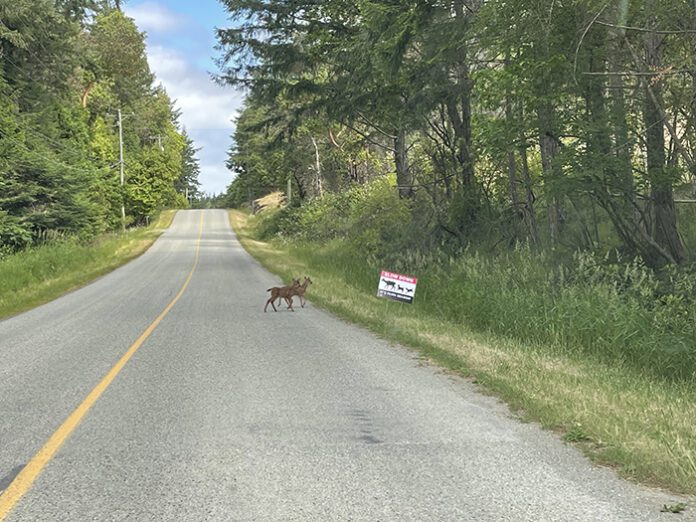BY MARCIA JANSEN
Driftwood Contributor
It’s the time of year again: fawns are born and start to follow their mothers, and inevitably cross our roads. Marielle Bonnet, animal care manager at the Island Wildlife Natural Care Centre, urges people to slow down for the safety of animals and humans.
Bonnet has been working at the island’s wildlife rescue centre, located in the south end, since 2000. She said in recent years she has seen a stark increase in the number of deer and fawns hit by cars.
“With the increase in population and traffic on Salt Spring Island, we have seen a noticeable rise in the number of fawns hit by vehicles in recent years,” Bonnet said. “Each year, we rescue between 30 and 40 deer. We used to care for one or two fawns hit by vehicles each year, but currently, around 50 per cent of the fawns that we rescue have been hit by cars.”
Deer and their young often follow the same paths every day, so volunteers have been placing signs on the sides of the roads at the most dangerous locations where deer and fawns are frequently struck.
“We urge people to slow down when they see these signs or a deer on the side of the road. Give it time to cross the road because there may be one or two fawns, as twins are a frequent occurrence, following closely. Of course, we ask people to be cautious and only slow down when it is safe to do so. We don’t want anyone to cause or get hurt in an accident.”
Some people may say that we have a large deer population on Salt Spring Island and losing a few is not that bad.
“We actually don’t have an estimate on how many deer we have on the island and I am sure that we lose far more deer to cars, diseases, dogs and hunting than we would if we had more bears and cougars on the island,” Bonnet said. “And no matter how many deer we have on Salt Spring, getting hit by a car and suffering from internal bleeding and multiple fractures on the side of a road is a horrendous way to die.”
Most of the black-tailed deer are born between May and June. The first two weeks of their lives they stay mostly in one place, while their mothers are foraging close by.
“Fawns have white spots for camouflage and no scent to keep them safe from predators and in those two weeks the moms are usually not far away. If you find a fawn lying down alone around this time of year, they are likely in trouble since they are older and should be walking and be with their mother. If you think a fawn is injured or orphaned, please do not touch it and call us right away so we can check on it.”
Between June and mid-September, we have another baby boom when the harbour seals are born. If you see a baby seal all by itself, it is always wise to call the wildlife centre.
“Female harbour seals raise their pups in rookeries, which are isolated rocks or small islands away from populated areas. They do not nurse on beaches where people are around. When a baby seal is born it can swim like a rocket, and mother and pup always stay together. So when you see one by itself on a beach, in a marina or a harbour, it could be orphaned.”
Bonnet, who worked in the Netherlands at the biggest seal rescue in Europe and has 25 years of experience working with seals, explains how you can recognize an orphaned seal pup.
“When it’s constantly crying, has punctures or wounds, is thin and lethargic, suckling on inappropriate objects like boats or kayaks, or trying desperately to haul out on a boat or a dock, or if you see a pup stranded in an unusual location like a busy beach, it is likely orphaned. If you see these signs in a seal pup, don’t touch it and call us so it can be accurately assessed by trained professionals. You could save a life.”
The Island Wildlife Natural Care Centre can be reached at 250-537-0777 seven days a week.

